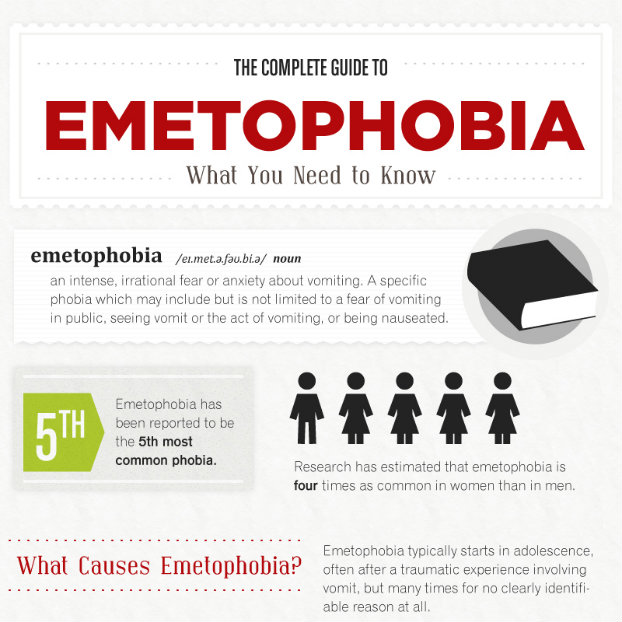 Anxiety is one nasty little bugger, contributing to your emetophobia, raising your blood pressure and even making you cranky or keeping you up all night. As we noted in a previous post, anxiety and stress are contagious, but you don’t have to automatically fall prey. We gathered a few methods with which you can not only inoculate yourself against contagious anxiety but reduce your overall levels of anxiety in general.
Anxiety is one nasty little bugger, contributing to your emetophobia, raising your blood pressure and even making you cranky or keeping you up all night. As we noted in a previous post, anxiety and stress are contagious, but you don’t have to automatically fall prey. We gathered a few methods with which you can not only inoculate yourself against contagious anxiety but reduce your overall levels of anxiety in general.
Avoidance
Steering clear of people who are oozing anxiety is likely the safest way to avoid picking up any of their contagious stress. Perhaps it’s time to reassess certain friendships if those relationships always leave you wound up or depressed. Maybe it’s time to switch jobs if your entire pool of colleagues is one big stress puddle. Avoidance can be a drastic tactic, but, hey, your mental health is worth it.
Communication
When getting away from a human anxiety volcano is not possible, communication may be the key. Psychology Today blogger Sherry Pagoto suggests starting up that communication the moment you notice stress start to seep in, before the situation escalates and blows.
“However,” Pagoto warns, “be careful to avoid catering to them when they are stressed out, it will likely reinforce their bad behavior when under stress.”
Bending over backwards to accommodate their stress with soothing words, or dropping everything to run and book them a massage can show the person that being stressed out in your presence results in rewards. That’s definitely not the message you want to get across.
You instead want to sit the person down when he or she is still in the calm and lucid stages of early stress and talk to the person in a straightforward manner. If you missed out on the window of opportunity and the person is already a frazzled mess, wait until he or she calms down until you start up a conversation. Yes, you can still communicate after the fact, a move that can help deter the behavior in the future.
You probably already realized that simply ignoring it, living through it or pandering to it are not typically maneuvers that make it go away. You instead ask if the person has a moment to speak with you then sit down and tell them how his or her stress-fueled tirades, breakdowns or other habitual displays of anxiety fills you up with the same level of anxiety.
Pagoto brings in a helpful strategy when it comes to discussing issues in any relationship, which is to start your sentences with “I” and not the accusatory “you.” The “you” automatically puts people on the defense, making it likely they’ll be so busy defending themselves that they’ll get nothing useful out of the conversation. It’s also a good tactic to pinpoint a specific example of the person’s behavior so he or she knows exactly what you’re talking about.
To your coworker:
- Say: “I felt stressed out and even kind of scared when you threw the client’s file across the room.”
- Not: “Your temper tantrums are unprofessional and I’m reporting you to human resources if you ever do it again.”
To your significant other:
- Say: “I feel anxious and upset when you run around the house each morning screaming that you’re late.”
- Not: “Your freak outs are freaking me out and if you don’t cut them out I’m moving out.”
Watching Your Own Back
Sometimes the level of anxiety we absorb from others is partly our fault. It’s not a bad thing to be a very empathetic person, but it can be detrimental if you notice the pain and woes of others too easily seem to take over your life. Pagoto offers up an example of this type of person in the form of a woman who was devastated by the death of her neighbor’s brother.
The woman cried, carried on. She was unable to function effectively or get the death out of her mind. What’s odd about that? The woman didn’t even know the man (nor was she particularly close with the neighbor). But it wasn’t the death of the neighbor’s brother per se that was fueling the anxiety.
“Just hearing about a death made her anxious about losing her own loved ones and sent her into bad feelings that she had a hard time turning off,” Pagoto explains.
If you happen to be a super-empathizer, just being aware of that fact can help you keep a check on how much anxiety you absorb. If possible, you may also want to steer clear of particularly stressful situations, horror shows, or other people in crisis that you know are surefire anxiety inducers.
Watching (and Changing!) Your Own Anxiety Process
Being aware of the way you process anxiety can also be incredibly useful, especially if you can go on to change that process. As noted by Rev. Marty Troyer’s Houston Chronicle’s Peace Pastor blog, it’s human nature to deal with anxiety by passing it on or magnifying it. And we typically do this through:
- Triangling (not speaking directly to someone, but using a third part as our messenger)
- Being passive aggressive
- Blaming someone
- Distancing ourselves
- Shutting down
- Escalating the conflict
Keeping our own anxiety levels in check is possible if we kick out the old tactics and try some new ones.
Breathe in anxiety, breathe out compassion: This technique reigns high in Buddhism. Troyer adds it is, indeed possible to become a so-called “anxiety sponge” as long as you transform that anxiety into peace somewhere within the sponge.
Honor your anxiety: Just like any other emotion, anxiety is trying to tell us something. It is also highly unlikely to go away if we keep trying to shove it deep down in some inner crevice where we hope we simply won’t feel it anymore. Even if you can’t honor the anxiety, at least give it room to unfold and feel it. Let it do its little dance, examine what it may be trying to tell you, and then let it go on its way.
Stay spiritually fit: Taking care of your body, mind and soul is a must for successfully functioning as an anxiety sponge that doesn’t disintegrate under pressure. It also establishes a firm foundation that can better take on whatever life hands us, including high levels of anxiety. Try meditation, exercise, nature walks and other activities that fuel you with positive vibes.
SOURCES:
Photo Credit: harold.lloyd via Compfight cc





